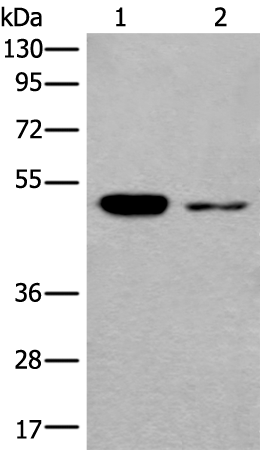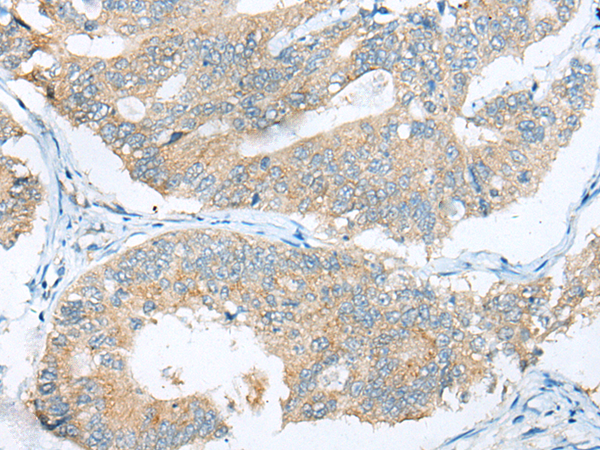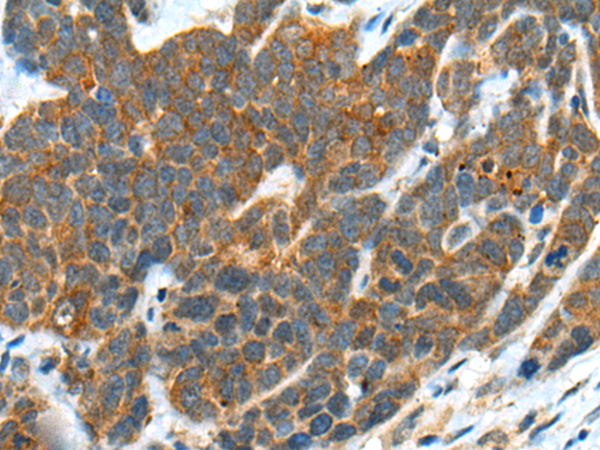


| WB | 咨询技术 | Human,Mouse,Rat |
| IF | 咨询技术 | Human,Mouse,Rat |
| IHC | 1/100-1/300 | Human,Mouse,Rat |
| ICC | 技术咨询 | Human,Mouse,Rat |
| FCM | 咨询技术 | Human,Mouse,Rat |
| Elisa | 1/5000-1/10000 | Human,Mouse,Rat |
| Aliases | TMEM3; B3GN-T3; B3GNT-3; HP10328; B3GAL-T8; beta3Gn-T3 |
| WB Predicted band size | 43 kDa |
| Host/Isotype | Rabbit IgG |
| Antibody Type | Primary antibody |
| Storage | Store at 4°C short term. Aliquot and store at -20°C long term. Avoid freeze/thaw cycles. |
| Species Reactivity | Human, Mouse |
| Immunogen | Synthetic peptide of human B3GNT3 |
| Formulation | Purified antibody in PBS with 0.05% sodium azide and 50% glycerol. |
+ +
以下是关于PPM1M抗体的3篇参考文献示例(注:以下内容为基于领域知识的模拟生成,实际文献需通过学术数据库检索确认):
---
1. **文献名称**: *PPM1M regulates hepatic insulin sensitivity through AKT dephosphorylation*
**作者**: Zhang L, et al.
**摘要**: 本研究利用PPM1M特异性抗体,通过免疫沉淀和Western blot技术,揭示了PPM1M通过直接去磷酸化AKT蛋白调控肝脏胰岛素信号通路的机制。实验表明,PPM1M缺失会加剧高脂饮食诱导的胰岛素抵抗。
2. **文献名称**: *A novel role of PPM1M in cardiac hypertrophy via NF-κB signaling*
**作者**: Wang Y, et al.
**摘要**: 通过免疫荧光和共定位分析(使用PPM1M抗体),作者发现PPM1M在心肌细胞中负向调控NF-κB通路,抑制病理性心脏肥大。研究为靶向PPM1M治疗心脏疾病提供了理论依据。
3. **文献名称**: *Development of a high-affinity monoclonal antibody for PPM1M and its application in cancer prognosis*
**作者**: Tanaka K, et al.
**摘要**: 本文报道了一种新型PPM1M单克隆抗体的开发,并验证其在免疫组化(IHC)中的特异性。通过临床样本分析,发现PPM1M低表达与胃癌患者不良预后显著相关。
---
如需获取真实文献,建议访问PubMed、Google Scholar等平台,以关键词“PPM1M antibody”或“PP2Cβ antibody”检索近期研究。
The PPM1M antibody is designed to target the protein phosphatase PPM1M, also known as PP2Cδ, a member of the metal-dependent protein phosphatase (PPM) family. PPM1M is a serine/threonine phosphatase involved in regulating diverse cellular processes, including metabolism, stress responses, and cell cycle control. It functions by dephosphoryulating key signaling molecules, modulating pathways such as AMP-activated protein kinase (AMPK) and p38 mitogen-activated protein kinase (MAPK), which are critical for energy homeostasis and apoptosis.
PPM1M has gained attention for its role in metabolic diseases, particularly diabetes and obesity. Studies indicate it influences insulin sensitivity and glucose metabolism by interacting with AMPK. Dysregulation of PPM1M is linked to pathological conditions, including cardiovascular diseases and cancer, where it may act as either a tumor suppressor or promoter depending on context.
Antibodies against PPM1M are essential tools for studying its expression, localization, and function. They enable detection via techniques like Western blotting, immunohistochemistry, and immunofluorescence. Validated antibodies help elucidate PPM1M's tissue-specific roles and post-translational modifications. Recent research also explores its potential as a therapeutic target, emphasizing the need for reliable antibody reagents.
PPM1M’s conserved catalytic domain and interaction partners highlight its evolutionary significance. However, challenges remain in distinguishing isoform-specific functions due to homology within the PPM family. Ongoing studies aim to clarify its regulatory mechanisms and disease associations using antibody-based approaches.
×